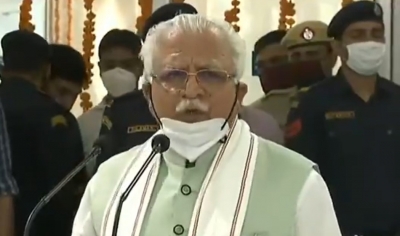

Haryana Chief Minister Manohar Lal Khattar
<p>
A high level South Korean delegation led by South Korean ambassador to India Shin Bongkil is slated to meet Harayana chief minister Manohar Lal Khattar this week to discuss investment plans in the state amid the Covid 19 pandemic.</p>
<p>
Kim Moon-young, Managing Director, South Asia HQ, Korea Trade-Investment Promotion Agency (KOTRA) and several other chiefs of Korean companies will also be present in the meeting.</p>
<p>
While at present there are just about 750 Korean companies operating in the country, several firms are eyeing investment opportunities here notwithstanding the pandemic.</p>
<p>
<strong>Also read: <a href="https://www.indianarrative.com/economy-news/finally-global-investors-head-to-india-s-northeast-81560.html">Finally global investors head to India&#39;s northeast</a></strong></p>
<p>
Just two months ago, South Korean companies and investors visited Sikkim to explore investment opportunities.</p>
<p>
&ldquo;We should see our relationship with India on a very strategic level,&rdquo; Bongkil, said last year at a closed-door meeting organised by Asian Community News, a platform that works closely with the community. In fact, Korean culture, films, music and food are now gaining a wider audience in India, especially in Gurugram.</p>
<p>
The cosmopolitan millennium city in the national capital region has turned out to be the most favourite living city for most Southeast Asian expats including the Koreans.</p>
<p>
<strong>Also read: <a href="https://www.indianarrative.com/latest-news/s-korea-to-foster-parts-suppliers-for-next-generation-cars-94712.html">S Korea to foster parts suppliers for next generation cars</a></strong></p>
<p>
A Times of India report said that Korean form the largest expat community in Gurugram. About 3000 Koreans live and work in Gurugram and its vicinity. The high-profile expatriate corporate life has given rise to a unique eco-system in Gurugram, dotted with many authentic Southeast Asian restaurants serving Korean and Japanese food. Not just restaurants, there are multiple grocery stores and even salons catering only for the Southeast Asian community.</p>
<p>
The number of restaurants and grocery stores in only increasing. Consider this. Aeryoun Jeon, who hails from South Korean has made Gurugram her adopted home. She runs three grocery stores &ndash; Epicure– in the millennium city. Jeon&rsquo;s stores are doing brisk business. Her customers comprise expats including South Koreans and Japanese. &ldquo;When you visit these grocery stores, you will realise that there is no difference between the shops back home and here. They store everything and more,&rdquo; said a Korean customer.</p>
<p>
Jeon, interestingly, has a large number of Indian customers too.&nbsp; &ldquo;I have been in India for over 10 years now. My first store came up 10 years ago but now I have three as the demand for Korean and Japanese grocery items has grown. The situation was not like this a few years ago,&rdquo; the affable Jeon said.</p>
<p>
<strong>Also read: <a href="https://www.indianarrative.com/latest-news/gurugram-to-kick-off-sero-survey-from-june-94810.html">Gurugram to kick off sero survey from June 15</a></strong></p>
<p>
Epicure is just one of the many grocery store chains catering to the southeast Asian community. Ichiba Food Store, Seela Food Mart, Bibimbam, Sibang, are among others too, which have a niche clientele.</p>
<p>
&ldquo;When it comes to living in India, Gurugram is the most accepted place now. The satellite town has an eco-system which makes the southeast Asian families comfortable. They are comfortable living here because of the cosmopolitan nature of the town,&rdquo; Sanjeev K Ahuja, editor in chief and promoter, Asian Community News told India Narrative.</p>
<p>
As India gears up to lay the red carpet for investors, it is imperative to create a conducive environment for the expats to feel at home. This would mean providing them access to both hard and soft infrastructure which includes roads, schools with international syllabus. Shopping establishments which sell products required by the people from these countries are equally important.</p>
<p>
&nbsp;</p>
BusinessWire India QpiAI, a leader in quantum computing and generative AI, announced its First Quantum…
In a show of solidarity, members of the Awami Workers Party gathered in Aliabad, Hunza,…
China's retaliatory actions have resulted in up to a 245 per cent tariff on imports…
Chinese officials have interrogated and detained local Tibetans who shared photographs and posts on social…
Paank, the human rights division of the Baloch National Movement (BNM), has said that there…
The Indian Army showcases its prowess in the Plateau Sub Sector along the Line of…